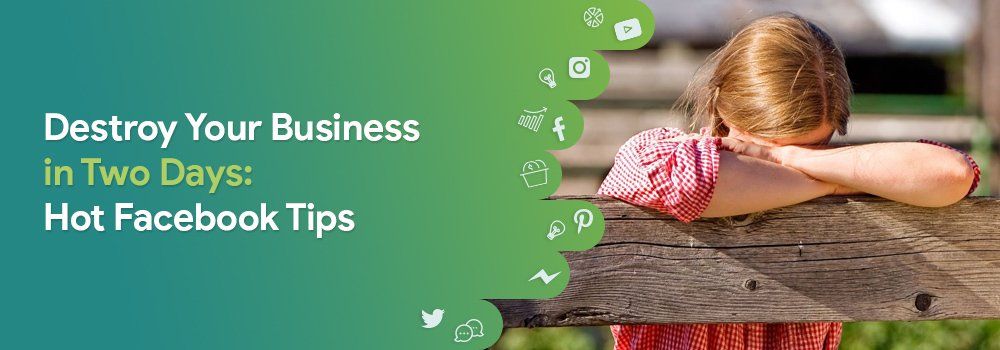
Destroy Your Business in Two Days: Hot Facebook Tips
It was a Facebook post that almost shut down the business, Wild Oats Farm. Users delivered a torrent of abuse after a photograph of an “underweight” horse was published on a local community page.
Online Abuse Destroys A Business
Wild Oats’ owner retaliated, defending herself. Allegedly things got heated between her and the moderator of Nelson Snippets, the community Facebook page.
A vet was called by Wild Oats’ owner to assess the horse. Hine was old, which explained her low weight. The vet added that a recent drought hadn’t helped her condition. But Hine was in “remarkably good health.” Most importantly, she was active and happy. He even reassured the local SPCA.
Few people would have even seen news of the vet’s assessment. The real action was on the original Snippets post. The comments and abuse continued. It even spilled over to Wild Oats’ own Facebook Business page.
The backlash against Wild Oats nearly forced the business to close. The owner’s daughter was even afraid to go to school.
Where, at the time it was needed, was the balance? And the reason? And the discussion? Where was the conversation that would’ve quickly put things right?
Algorithms Bury the Real Discussion
The dialogue was there, including from Wild Oats’ business owner herself. But anybody who uses Facebook knows how its algorithms reward the popular comments. These liked or reacted comments are pushed up, and made more visible.
Time-poor scrollers only saw the hate. The reasoned discussion was only seen by those who bothered to dig deeper.

Image Courtesy Stuff.co.nz
This didn’t happen by chance. It is a deliberate function of Facebook’s code. Engagement, and time spent online, are its mandate. The more passion and emotion the better. It helps deliver more attentive audiences to advertisers.
If algorithm isn’t enough, Facebook often adds up- and down-voting to comments. In some posts, it even suggests stickers to offer contextual responses to the content. One such reaction sticker recently suggested to me for a colleague’s post about unfriending was simply “bye!”
Without doubt, such features encourage a mob mentality. They whip users into a torches- and- pitchforks frenzy.
Add ‘virtue-signalling,’ people’s tendency to show excessive moral righteousness whenever friends or family are watching. And add ‘moral licensing.’ That’s the belief that anybody – or business – who breaks an ethical code forfeits their rights to compassion. Or even a voice.
It is a combination that leads to behaviour that can be truly brutal, with the call for reason drowned out.
We’re All
Nazis In Social Media
I have personal experience in this area. And it came, ironically, from a discussion about Nazis. The original Third Reich ones, not just the label that gets slapped on anybody with a contrary opinion.
The post had said something about Nazis being inhuman monsters. This kind of vilification is popular, but it is also incorrect. It is, literally, dehumanising of a group of people based on their beliefs. Granted, those beliefs are highly offensive. But demonisation of people opens the door to us-and-them tribalism.
Ironically, that’s exactly what the Nazi dogma did.
I pointed out that Nazis had actually been ordinary people. They were capable of kindness, love and compassion within their own circles. Despite that, they had also categorised certain minorities as being subhuman, and needing to be exterminated. Horrific, but also very human.
Did my insight gain understanding and open minds? No. This is the Age of Outrage.
I was told that Nazis were not human, and they should all be exterminated. Clearly I was a Nazi sympathiser and deserved to join them.
I was removed from the discussion group. Oh, the irony.

Muting the Conversation
That, perhaps, is one of the most challenging aspects of social media. We all have the right to avoid exposure to views and opinions we find offensive. Or dangerous. And, more practically, those we find uninteresting.
But at what point does it become self destructive? The combination of algorithms, peer affirmation, and the ability to block those who disagree with us make it too easy to reinforce our own beliefs. Without ever being challenged.
There is a big difference between removing ourselves from a thread we find offensive, and using that outrage to shut down the whole discussion. Free speech is an essential part of any democratic society. Even fringe views should be discussed, if even just to be refuted.
Getting Back into Business
We have digressed. What of the business that fell victim to Facebook outrage and persecution? What of Wild Oats Farm?
In his book The 4 Billion Dollar Tweet, Ryan Holmes, CEO of Hootsuite has a recommendation. All businesses should have a recovery strategy for any social media crisis.
Damage Control Strategy: Keep Calm and Carry On
According to our Chief Conversologist Jam Mayer, a small business is no exception. Even though social media is likely to be part of a huge daily workload, it should have a strategy in place.
For a start, a strategy can help avoid the business owner sending knee-jerk clap-backs and heated responses. Those reactions can simply make a bad situation worse. Instead, just follow the process.
A strategy helps you focus on dealing with the issue calmly. Do you respond? Start damage control? Report the matter and hope that social media moderators or the platform itself deals with it quickly enough? Ignore it and hope it goes away?
Those are decisions that shouldn’t be made in a panic.
Thankfully, in the case of Wild Oats Farm, this story has a happy ending. It starts with the fact that mainstream media picked it up.
The website Stuff carried the story. Stuff reported on the bullying and outrage. It was followed by a piece on TV’s One News. Now, there was a strong reaction in support of Wild Oats.
Not everybody was convinced, but Wild Oats Farm received almost only positive reviews as a result. Ironically, as a result, Nelson Snippets, the Facebook Community page that had initially refused to take down the original post, was eventually removed by Facebook itself.
Would the story have ended differently if mainstream media didn’t step in? Would common sense, and the better side of human nature, have triumphed anyway? Could Wild Oats have bounced back under its own strategy?
Is social media capable of maintaining reason and balance?
Can Facebook nurture true conversation? For the benefit of advertisers it has deliberately created an environment that favours the popular view over the reasoned one.
Clearly, balance was one of the aims of fragmenting Facebook’s audiences into communities. Unfortunately, Facebook’s tactic may have the opposite effect in the case of a small-town business. It becomes a magnifying glass.
As the Facebook fragmentation continues conversations move into communities and private spaces, these questions are likely to become more pressing.
Watch this space …


